Key takeaways:
- Vintage car expos celebrate automotive history, offering insights into engineering and cultural significance through vivid storytelling from collectors.
- Networking and community engagement at expos inspire new ideas and foster connections among enthusiasts, promoting automotive heritage preservation.
- Preparation is key when attending expos; planning routes, scheduling sessions, and bringing essentials enhance the overall experience.
- Successful vintage market purchases require research, negotiation skills, and trusting one’s instincts to avoid impulsive decisions.

Understanding Vintage Car Expos
Vintage car expos are more than just events; they are celebrations of automotive history and culture. I still remember my first expo and the buzz in the air—it felt electric. You might find yourself wandering among gleaming classics, each with its own story, sparking a nostalgia that’s hard to resist.
As I explored various booths, I was struck by the passionate collectors and restorers who poured their hearts into these vehicles. Have you ever noticed how a conversation about a vintage car can ignite excitement in people? Each car represents years of artistry and craftsmanship, and the owners often share tales that can transport you to another time.
At these expos, I’ve also learned that understanding vintage cars goes beyond just admiration; it’s about appreciating the engineering and the cultural significance behind each model. It’s fascinating to see how the design reflected the era it came from, and I often wonder, how do those details impact our perception of the past?
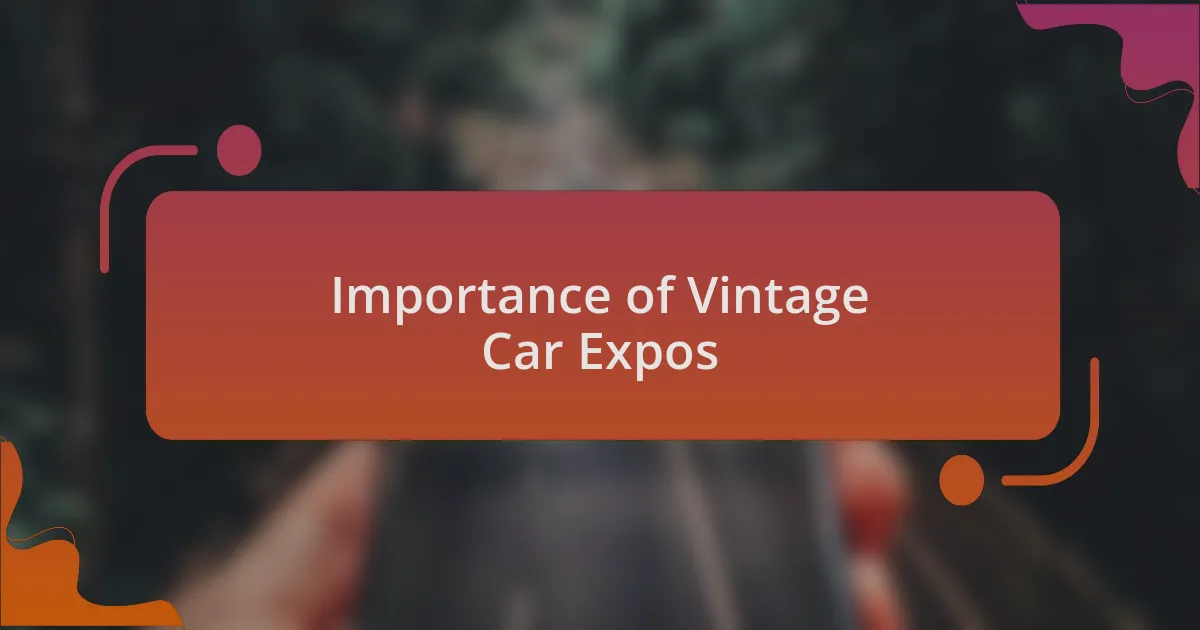
Importance of Vintage Car Expos
Attending vintage car expos is vital for nurturing a sense of community among enthusiasts. I’ve found that sharing experiences with fellow collectors can spark inspiration and new ideas for my own projects. Have you ever chatted with someone about their restoration journey? There’s an unspoken bond formed when you discuss the challenges and triumphs of reviving a classic.
These events also serve as a gateway to learning about automotive history. I remember standing next to a beautifully restored 1965 Mustang, and the owner enthusiastically explained how each design choice was influenced by the social changes of the time. Reflecting on how the automotive industry mirrored societal values made me appreciate not just the cars, but also the stories behind them.
Moreover, vintage car expos can be crucial for the preservation of automotive heritage. I often meet younger enthusiasts who are just beginning to explore this world, and their eagerness is truly refreshing. How can we expect the legacy of these remarkable machines to endure if we don’t pass on our knowledge and passion? Each conversation I have seems like a small step toward igniting that same fire in the next generation.
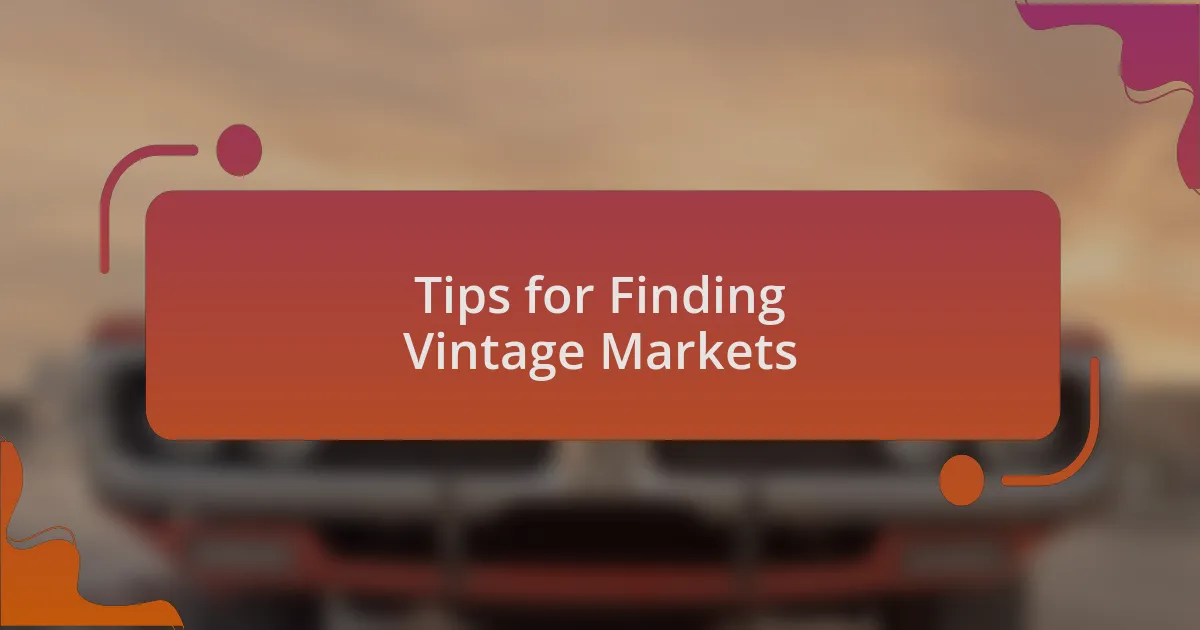
Tips for Finding Vintage Markets
One effective way to uncover vintage markets is to follow local community boards and social media groups dedicated to vintage cars. I remember discovering a hidden gem of a vintage market through a Facebook group where members frequently shared upcoming events. Have you ever been surprised by what your local area has to offer?
Another tip is to make connections with local car clubs or vintage car shops. I’ve found that many of these communities are in the know about little-known markets and sales. Just last month, I struck up a conversation with a shop owner who invited me to a private market event that featured unique automotive parts. It’s incredible how a simple chat can open doors to extraordinary opportunities.
Don’t overlook the power of networking at car shows and expos. One time, I met a fellow enthusiast who generously shared information about a monthly vintage market that I had never heard of before. Engaging with others not only brings insights but can also lead to lasting friendships within the vintage car community. If you’re open to the experience, the connections you make can truly enrich your journey.
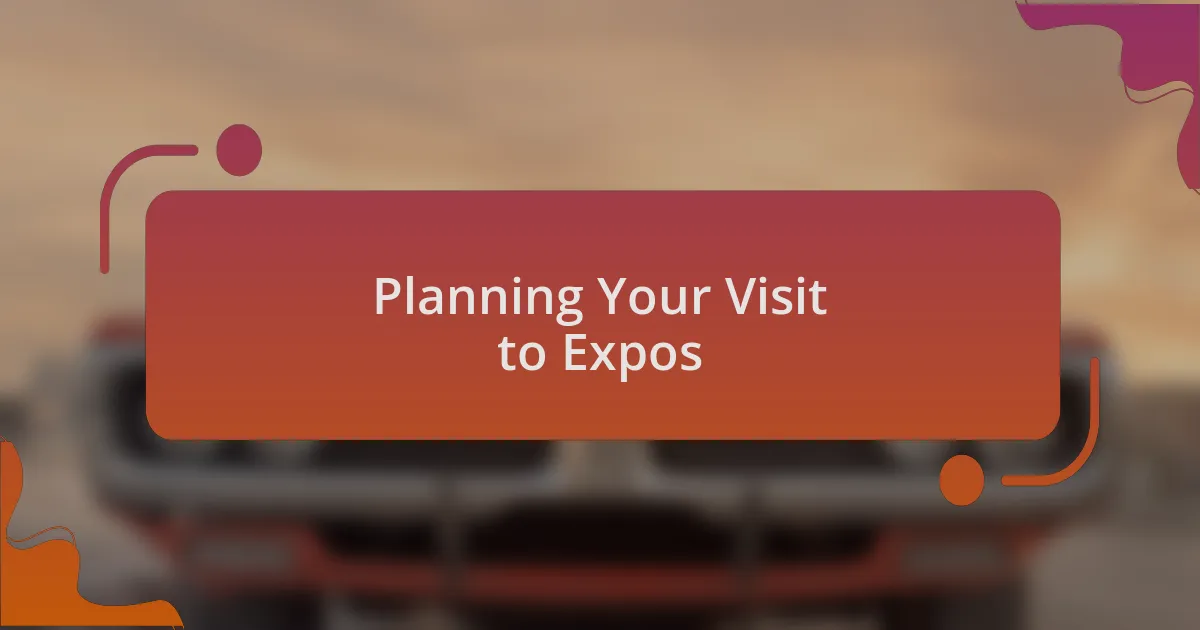
Planning Your Visit to Expos
Planning your visit to expos is all about preparation. I like to check the schedule ahead of time to mark the sessions and displays that most interest me. One time, I found a seminar led by a vintage car restoration expert that dramatically changed my approach to restoration projects. Have you ever stumbled upon a session that left you with a new perspective?
Another important aspect is mapping out the venue. I’ll often grab a floor plan and highlight where I want to go. At a recent expo, I missed out on a fantastic booth because I didn’t plan my route efficiently. It’s frustrating to think about the treasures I might have found if I had taken a moment to strategize.
Lastly, don’t forget to bring essentials like water and a notepad for jotting down notes or contacts. I remember feeling overwhelmed at an expo, trying to recall where I had seen that rare part I wanted. Having a small kit ready to go can help you stay focused and make your visit more enjoyable. What little conveniences do you find invaluable when navigating these bustling events?
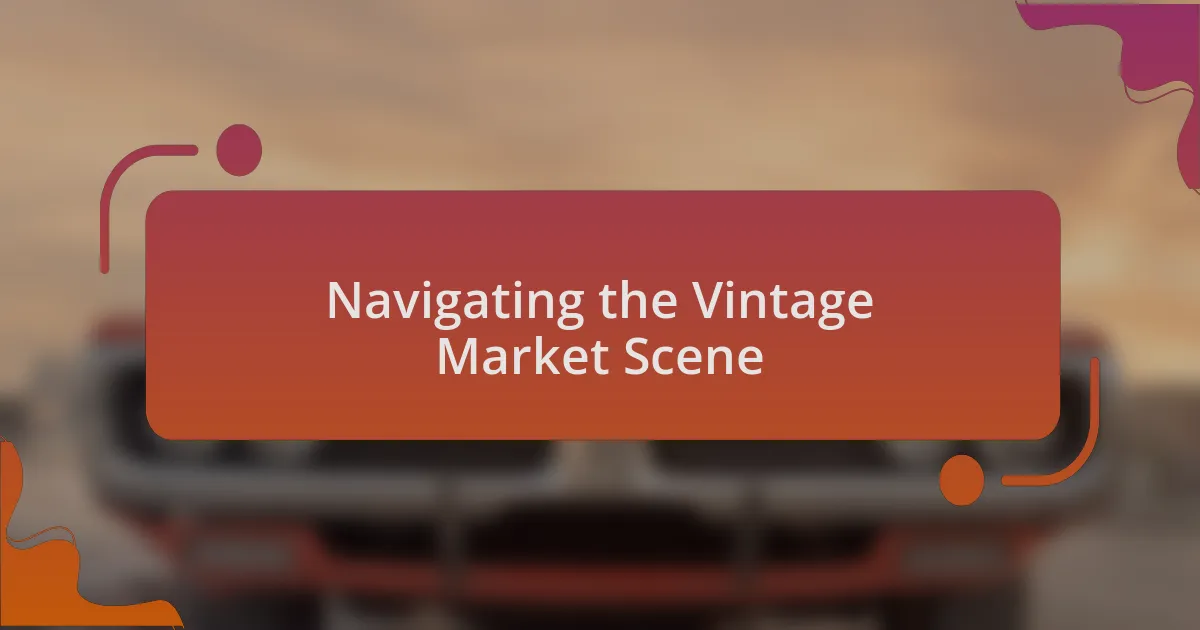
Navigating the Vintage Market Scene
I find that stepping into a vintage market can be both exhilarating and a bit daunting. The sheer variety of cars and memorabilia can overwhelm even seasoned enthusiasts. I remember my first vintage car show where I simply wandered aimlessly, excited but unsure where to direct my energy. Have you ever felt that rush of possibility mixed with confusion?
I’ve learned to engage with vendors, as they often hold a wealth of knowledge. There was a time when I spent an hour discussing the unique features of a 1965 Mustang with a passionate seller. This not only deepened my appreciation for the car but also helped me build connections that have proven invaluable. Don’t you think a simple conversation can spark inspiration?
Additionally, keeping an open mind while browsing is crucial. Some of my best finds came when I ventured beyond my usual preferences. Once, I stumbled across a beautifully restored 1971 Volkswagen that I hadn’t considered initially, and it turned out to be a dream car. What unexpected delights have you discovered by exploring different paths in your vintage journey?
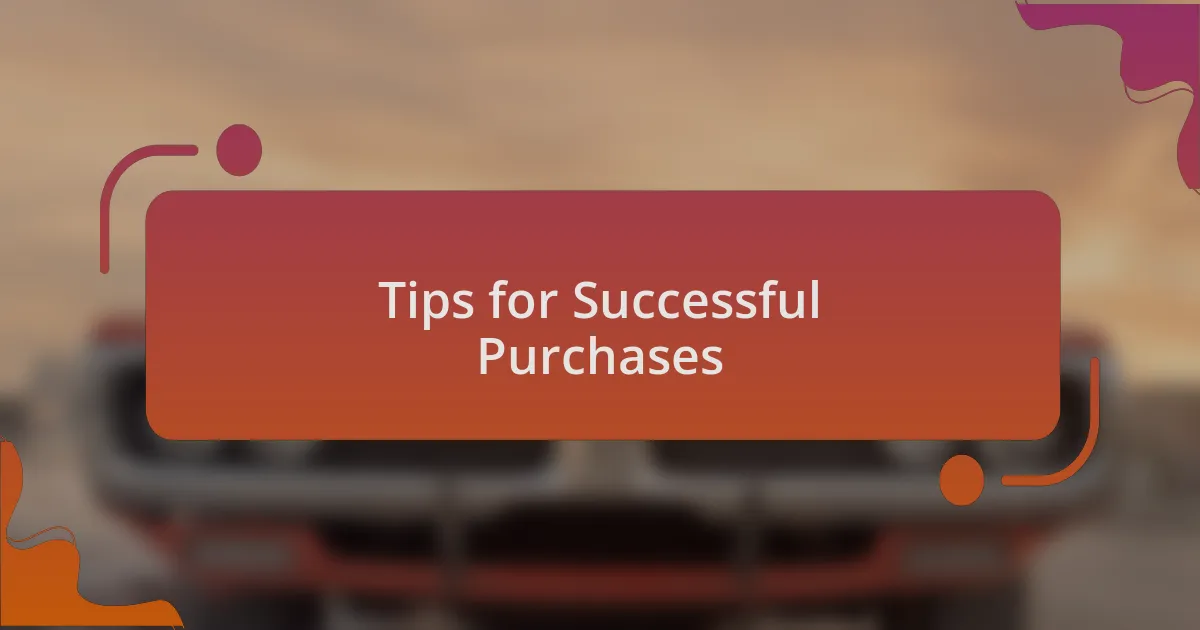
Tips for Successful Purchases
When you’re ready to make a purchase, it’s essential to do your homework beforehand. I remember once going to a vintage market with a list of specifications for a classic Ford. Arriving without research could have led me to impulsively buy something that didn’t meet my needs. Have you ever bought something on a whim only to regret it later?
Negotiating is another crucial skill in the vintage scene. I recall haggling over a beautiful set of vintage hubcaps; the seller initially had a firm price. However, I politely shared my budget and my research findings, which led to a fair compromise. It’s a delicate dance—have you ever found a price that felt just right after some back-and-forth?
Finally, trust your instincts and listen to that inner voice. One time, I was about to pass on a seemingly worn-out classic. Yet something about it tugged at me. After a closer look, I recognized its potential and ended up restoring it into a showpiece that I cherish to this day. Have you ever had a “what if” moment that turned into something extraordinary?